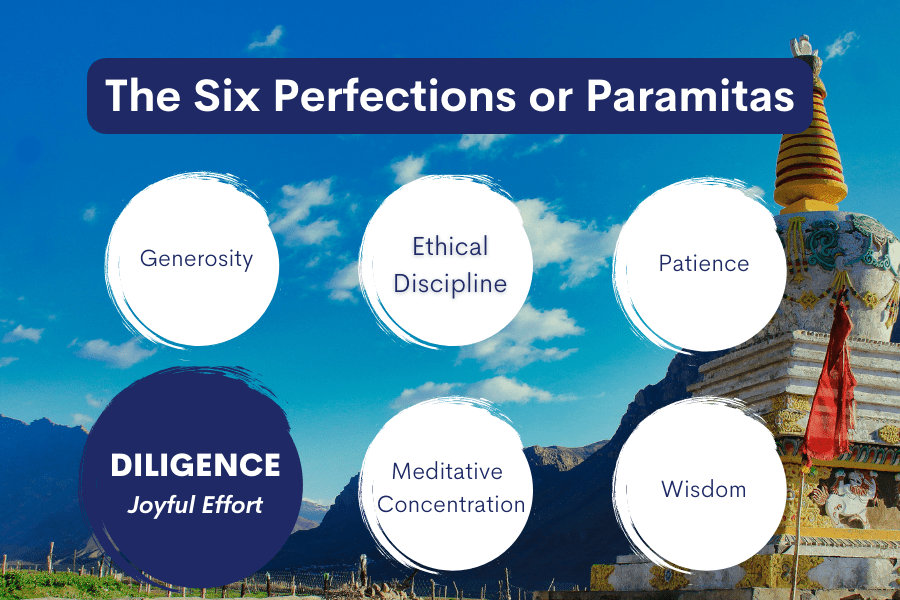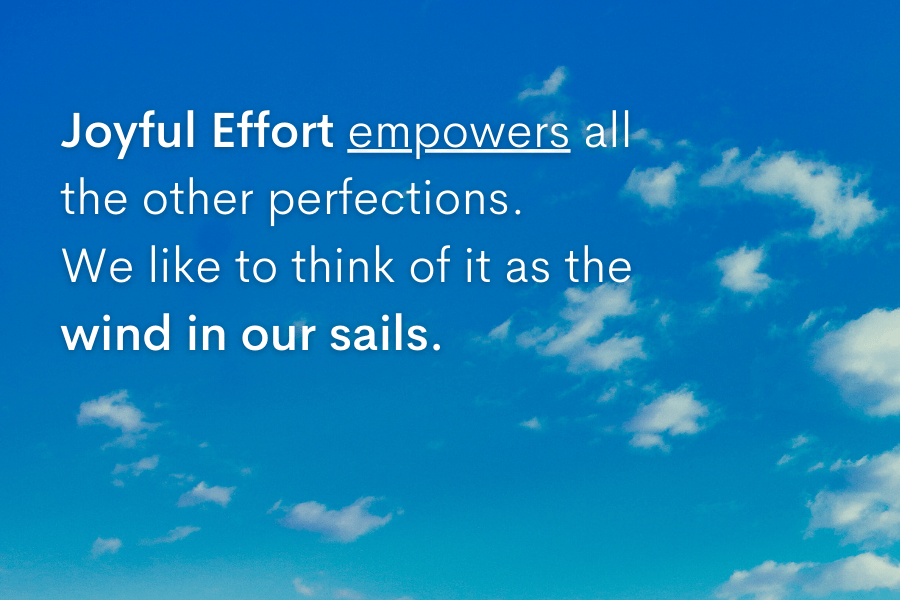Our exploration of the Six Perfections or Six Paramitas brings us to the Perfection of Diligence or Joyful Effort. The Six Perfections are essential to Vajrayana and Mahayan Buddhism. These perfections are Generosity, Ethical Discipline, Patience, Joyful Effort or Diligence, Meditative Concentration, and Wisdom. According to the Buddha’s teachings, each of the Six Perfections is considered essential for achieving enlightenment.

Have you ever set a goal to meditate more but then found yourself strictly following your practice goals without enjoyment? Or maybe you gave up on meditation entirely because you found no joy in the process? Most of us experience these types of situations throughout our meditation journeys. If developing and sticking to a daily meditation practice was easy for you, please share your secret!
When we arrive at this impasse, and most of us will, it may be helpful to contemplate how meditation has positively impacted our lives. Seeing the benefits on the cushion and in our daily lives can serve as an antidote to laziness and help us find enthusiasm for our meditation practice. That enthusiasm is an aspect of the Perfection of Diligence or Joyful Effort. Lama Tsomo provides a short description of Joyful Effort in her most recent book, Deepening Wisdom, Deepening Connection.
What is Joyful Effort or Diligence?
“You’ve probably noticed by now that I really focus on the ‘joyful’ part of the effort because then I’ll be more likely to make the effort! If we expect to feel good as a result of our efforts, it makes those efforts feel like part of the whole happy experience.
When I was growing up, I remember noticing that the best part of Passover was working in the kitchen with my mother and sister, preparing all the yummy foods for the feast, setting the table just so, and dressing up. In the same spirit, I’ve made a beautiful place for my practice, with everything arranged just so, having gathered this or that little treasure over the years. I put on my prayer shawl and settle into a beautiful, profound experience (well, in between distractions).
As I’ve said, the mind works largely through association. Over time, I’ve had many profound, beautiful, and powerful experiences in that place, doing those practices. All of this contributes to the ‘joyful’ part of the effort. So I suggest you, too, keep your eye toward the joyful part of the effort, always remembering that one joyful part is the true happiness that comes from the fruits of that effort. The other truly can be the journey. After all, the practice isn’t the enlightenment, but we can enjoy the practice.

Joyful Effort empowers all the other perfections. We like to think of it as the wind in our sails. But keep in mind that winds are always changing. This is natural and normal. Impermanence exists in all parts of our lives, even our meditation practice. Amidst life’s ups and downs, we will experience periods when our motivation for meditation is difficult to find. If we approach the lulls with understanding, then they’re less likely to become overwhelming roadblocks on our path.

The Benefits of Meditation
Since we know all things are impermanent, we may as well be prepared for the times our Joyful Effort wanes, right? We asked our community members what benefits they experienced from meditation, and here are a few things they shared:
- Increased focus
- Easier to refocus
- Easier to “catch” unhelpful thoughts and “swipe” them away
- Increased sense of relaxation
- Increased sense of overall enjoyment off the cushion
- Increased sense that I’m helping, being of use
- My meditation practice has helped me be more present in volunteering with hospice patients. It has allowed me to better observe and discern how I may be of service and to see what that service can teach me about my own mind.
- Increased compassion and ability to see the larger picture
- Less reactive
- Deeper capacity to be with what is
-
I pay more attention to my breaths.
-
I become more mindful in doing things.
-
I am in development phase of listening more and deeply.
Do you have any benefits you’d like to add to this list? Send them to [email protected], and we will add them to this list!
Discussing meditation with others is another great way to find additional motivation for meditation. In a meditation group or Learning Circle, you can hear about another person’s motivations for practicing and perhaps share in their Joyful Effort. Learn more about practicing with others and the benefits of joining a Learning Circle HERE.
